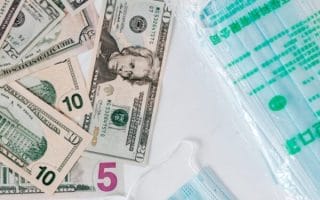Some people just hate saving money. It’s either too hard, too painful, or too much like a chore. Some people just can’t seem to find any extra in their budget to save. Whatever the reason you’re avoiding saving, maybe you’d do better if you could trick yourself into saving. The ideas below trick you into saving money. Some take you out of the equation altogether, some make saving into a game, and some are designed to sneak small amounts of money out of your pocket and into savings without you feeling much pain.
Carry only big bills: When you carry only twenties (or bigger bills) in your wallet, it’s usually harder to spend money. Why? Because there’s something psychologically painful about breaking that big bill, particularly for little purchases like gum and coffee. You’re more likely to decide that you don’t need whatever it is than if you had a bunch of fives and ones in your wallet. They don’t carry the same level of spending pain as the bigger bills do.
Put all change, dollar bills, or even $5 bills into savings: Switch to paying for almost everything with cash instead of debit or credit cards. This will generate a lot of change that you can put in a jar at the end of the day. You can start with just coins, but your savings will mount up faster if you also put in ones and the occasional five. If you’re sticking to using bigger bills (Number 1, above), then all the small bills should go into your savings.
Play games with your checkbook: When you enter a purchase into your check register, round it up to the nearest dollar. At the end of the month, transfer the overage into savings. Some banks offer debit cards that do this automatically (some even offer to match up to a certain amount), but you can do it yourself just as easily. The benefit to doing it yourself: You can direct your savings into any savings vehicle you choose rather than using the banks’ account, which may not be the highest earning account out there.
Put away coupon or sales savings: When you use coupons or buy something on a great sale, put the amount you saved into your savings account. Don’t spend the savings on more stuff, actually save it.
Automatic savings: When you get paid, have a set amount deducted from your check and deposited into a separate savings account. If you don’t see it in your checking account, you’ll be far less likely to spend it.
Save any “found money” Tax refunds, money that comes from the laundry or out of the sofa, rebates, and other unexpected money finds should go into savings. You don’t include them in your budget so don’t spend them.
Put away any money you save by talking yourself out of an impulse
buy: If you stand in a store for thirty minutes talking yourself into and out of some impulse buy that you don’t need, reward yourself when you finally say no and walk away. When you get home, take the amount you didn’t spend and put it directly into your savings account. You still “bought” something, only you did something constructive with the money.
Save your raise: If you get a raise and you don’t need it to cover your basic expenses, pretend you didn’t get it. Have the extra money transferred to your savings account.
Bank extra paychecks: If you’re paid weekly or bi-weekly, there will be a couple of months during the year when you’ll get an extra check. Since your budget is figured on two checks per month, you don’t need the extra one to take care of necessities so bank it.
Use online bill pay and bank the postage: For every bill you pay online, take the forty-four cents you would have paid in postage and drop it into your savings jar. It may not sound like much, but ten bills a month is $4.40 and $52.80 per year.
Switch providers, bank the savings: Anytime you switch providers (phone, cable, Internet, etc.) and get a lower priced package, bank the difference. Don’t adjust your budget downward. Just pretend you’re still paying the higher amount and put the difference in savings.
Bank your credit card rewards: If you use a credit card that gives cash back, put the reward money in savings. (This only works well if you pay the bill off in full every month and don’t accrue interest while chasing cash back.)
Brown bag your lunch, save your lunch money: Every day that you bring your lunch to work rather than eating out, put the amount you would have spent on lunch in your savings account.
Bank bill savings: Any time a bill is less than you’ve budgeted for (think about that month when the weather’s nice and your utility
bill is very low or you’re out of town and use little water), bank the savings. Because your budget for that bill is higher per month, banking the difference will not hurt you.
Pay yourself for your entertainment: Each time you watch a rented DVD, take the cost of the rental, subtract it from the cost of a movie ticket and bank the difference. If you make your own popcorn and snacks, throw the amount you’d have spent on movie theater food into your piggy bank.
Tip yourself: When you decide to eat at home rather than going out, pay yourself the amount you’d have tipped a waiter for a similar meal. You can keep a tip jar on your kitchen counter for this. For bonus money you can put the entire cost of your meal (what a similar meal would cost in a restaurant) plus the tip into the jar.
It is possible to find little bits of money in your budget, particularly if you’re willing to bank anything you save by using frugal tips and tricks. You would have spent the higher amounts of money anyway, but by being a little sneaky you’re putting the money to better use. Those little bits of money that you trick yourself into saving will add up to a tidy sum after a year.

Jennifer Derrick is a freelance writer, novelist and children’s book author. When she’s not writing Jennifer enjoys running marathons, playing tennis, boardgames and reading pretty much everything she can get her hands on. You can learn more about Jennifer at: https://jenniferderrick.com/.






Comments